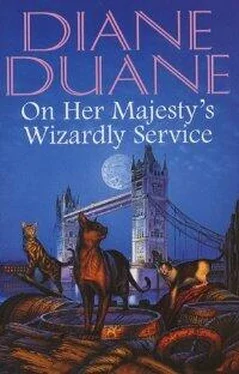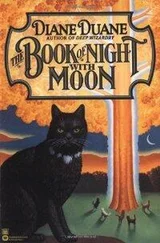Diane Duane - On Her Majesty's Wizardly Service
Здесь есть возможность читать онлайн «Diane Duane - On Her Majesty's Wizardly Service» весь текст электронной книги совершенно бесплатно (целиком полную версию без сокращений). В некоторых случаях можно слушать аудио, скачать через торрент в формате fb2 и присутствует краткое содержание. Год выпуска: 1998, ISBN: 1998, Издательство: Hodder & Stoughton, Жанр: Фэнтези, на английском языке. Описание произведения, (предисловие) а так же отзывы посетителей доступны на портале библиотеки ЛибКат.
- Название:On Her Majesty's Wizardly Service
- Автор:
- Издательство:Hodder & Stoughton
- Жанр:
- Год:1998
- ISBN:0-340-69330-4
- Рейтинг книги:4 / 5. Голосов: 1
-
Избранное:Добавить в избранное
- Отзывы:
-
Ваша оценка:
- 80
- 1
- 2
- 3
- 4
- 5
On Her Majesty's Wizardly Service: краткое содержание, описание и аннотация
Предлагаем к чтению аннотацию, описание, краткое содержание или предисловие (зависит от того, что написал сам автор книги «On Her Majesty's Wizardly Service»). Если вы не нашли необходимую информацию о книге — напишите в комментариях, мы постараемся отыскать её.
On Her Majesty's Wizardly Service — читать онлайн бесплатно полную книгу (весь текст) целиком
Ниже представлен текст книги, разбитый по страницам. Система сохранения места последней прочитанной страницы, позволяет с удобством читать онлайн бесплатно книгу «On Her Majesty's Wizardly Service», без необходимости каждый раз заново искать на чём Вы остановились. Поставьте закладку, и сможете в любой момент перейти на страницу, на которой закончили чтение.
Интервал:
Закладка:
On Her Majesty’S Wizardly Service
by Diane Duane
Pussy-cat, pussy-cat, where have you been?
I’ve been to London to look at the Queen.
Pussy-cat, pussy-cat, what did you there?
I frightened a little mouse under her chair.
In Life’s name, and for Life’s sake, I assert that I will employ the Art which is Its gift in Life’s service alone. I will guard growth and ease pain. I will fight to preserve what grows and lives well in its own way: nor will I change any creature unless its growth and life, or that of the system of which it is part, are threatened. To these ends, in the practice of my Art, I will ever put aside fear for courage, and death for life, when it is fitting to do so—looking always toward the Heart of Time, where all our sundered times are one, and all our myriad worlds lie whole, in That from Which they proceeded…
—the Wizard’s Oath, species-nonspecific recensionPROLOGUE
Patel went slowly up the gray concrete stairs to the elevated Docklands Light Railway station at Island Gardens; he took them one at a time, rather than two or three at once as he usually did. Nothing was wrong with him: it was morning, he felt energetic enough—a good breakfast inside him, everything OK at home, the weather steady enough, cool and gray but not raining. However, the package he was carrying was heavy enough to pull a prizefighter’s arms out of their sockets.
He had made the mistake of putting the book in a plastic shopping bag from the superstore down the street. Now the thing’s sharp corners were punching through the bag, and the bag’s handles, such as they were, were stretching thinner and thinner under the book’s weight, cutting into his hands like cheesewire and leaving red marks. He had to stop and transfer the bag from right hand to left, left hand to right, as he went up the stairs, hauling himself along by the chipped blue-painted handrail. When he finally reached the platform, Patel set the bag down gratefully on the concrete with a grunt, and rubbed his hands, looking up at the red LEDs of the train status sign to see when the next one would be along. I, the sign said, BANK, 2 minutes.
He leaned against the wall of the glass-sided station-platform shelter, out of reach of the light chill east wind, and put the bag down at his feet, sighing and gazing out over the bottom half of the Isle of Dogs.
Mostly what Patel was looking at, under the morning’s featureless overcast sky, was a vast construction site: the new tunnels for the extension of the Jubilee Line of the Underground were being driven through here, amid a welter of orange-painted cranes, lifters and mechanical digging machines with exotic foreign names, all of which made it almost impossible to see Island Gardens on the far side of the construction.
Patel sighed and thought about the morning’s class schedule. This was his second year of a putative three years at London Guildhall University, up in the City. He was well on his way toward a degree in mathematics with business applications, though what good that was really going to do him, at the end of the day, he wasn’t certain. There would be time to start worrying about jobhunting, though, next year. Right now, Patel was doing well enough, his student grant was safe, and whatever attention he wasn’t spending on his studies was mostly directed toward making sure he had enough money to get by. Though at least he didn’t have to worry about rent as yet—courtesy of his folks—there were other serious matters at hand. Clothes … textbooks … partying.
From down the track came a demure hum and a thrum of rails as the little three-car red-and-blue Docklands train slid toward the station. Patel picked up the book in his arms—he had had enough of the bag’s bloody handles—satisfied that at least this would be the last time he would have to carry the huge godawful thing anywhere. One of the jewelry students, of all people, had seen the For Sale ad on Patel’s Web page, and had decided that the metallurgical information in the book would make it more than worth the twenty quid that Patel was asking for it. For his own part, Patel was glad enough to let it go. He had bought the book originally for its mathematical and statistical content, and found to his annoyance within about a month of starting his second semester that it was more technical than he needed for the courses he was taking, which by and large did not involve metallurgy or engineering. He had put the book aside, and after that, most of the use it had seen involved Patel’s mother using it to press flowers.
The train pulled up in front of him, stopped and chimed: the doors opened, and people emptied out in a rush of briefcases and schoolbags going by, and here and there a few white uniforms showing from under jackets and coats—people heading to the hospital in town. Patel got on the last car, which would be the first one out, and sat in what would have been the driver’s seat, if there had been a driver: there was none. These trains were handled by a trio of straightforwardly-programmed PCs based somewhere in the Canary Wharf complex. The innovation left the first seats in the front car open, and gave the lucky passenger a beautiful view of the ride into town.
Patel, though, had seen it all a hundred times, and paid little attention until the train swung round the big curve near South Quay and headed across the water. There was something about the quality of the rail sound that changed there, probably to do with the way the water reflected it, and the increased noise level caught his attention. He gazed up briefly at the massive blue-sheened glass-clad tower of One Canada Place, what most people called “the Canary Wharf tower”, with its distinctive pyramidal top and the brilliant white double strobe flashing at the peak of the pyramid, then glanced down again at the building site just across the water from the tower and underneath the train, the new buildings rising on Heron Quays. Even though he knew a little about the place’s history, Patel found it hard to imagine this landscape, not full of construction gear and scaffolding, but jostling with the hulls of close-berthed ships, the air black with smoke from a thousand smokestacks, cranes loading and unloading goods: the shipping of an empire filling these man-made harbors and lagoons that had been dredged out of oxbows of the Thames. It had all vanished a long time ago, when Britain stopped being an empire and the mistress of the seas. This whole area had undergone a terrible decline after the war, during which it had been bombed nearly flat, and whatever was left had fallen into decrepitude or ruin. Now it was growing again, office space abruptly mushrooming on the waterside sites where the ships had docked to disgorge their cargoes. Only the street names, and the names of the Docklands stations, preserved the nautical memories: some of the old loading cranes still stood … but the warehouses behind them had been converted to expensive loft apartments. Slim black cormorants fished off Heron Quays, though the quays themselves were gone, slowly being replaced by more apartments and office space: and shining hotels and still more office buildings looked down on waters which were no longer so polluted that it would catch fire if you dropped a match in them.
The train pulled out of Canary Wharf station and headed northwestward away from the towers toward humbler real estate, the “less fortunate” parts of East London which had yet to benefit from the real estate boom in the Docklands. The names of the DLR stations grew less nautical, older: Limehouse, Shadwell … Patel got out at Shadwell to change for the little spur line to Tower Gateway, and stood there waiting for a few minutes. All around were four- or five-story brick buildings, their brick all leached and streaked with many years’ weather, tired-looking: scattered among them were council housing, ten-story blocks of flats done in pebble-dash and painted concrete, looking just as weary. These were not slums any more: not quite … though his father never tired of telling Patel and his mother how lucky they were to be able to afford someplace better. It was true enough, though it meant Patel had a three-quarter-hour commute to school every morning instead of a fifteen-minute walk.
Читать дальшеИнтервал:
Закладка:
Похожие книги на «On Her Majesty's Wizardly Service»
Представляем Вашему вниманию похожие книги на «On Her Majesty's Wizardly Service» списком для выбора. Мы отобрали схожую по названию и смыслу литературу в надежде предоставить читателям больше вариантов отыскать новые, интересные, ещё непрочитанные произведения.
Обсуждение, отзывы о книге «On Her Majesty's Wizardly Service» и просто собственные мнения читателей. Оставьте ваши комментарии, напишите, что Вы думаете о произведении, его смысле или главных героях. Укажите что конкретно понравилось, а что нет, и почему Вы так считаете.











